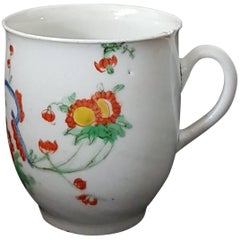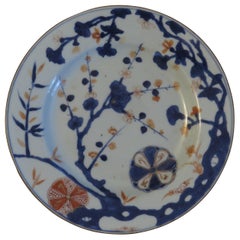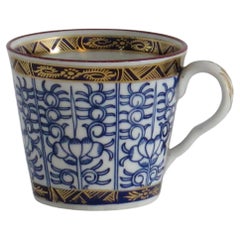Plymouth Porcelain Factory Furniture
to
1
1
1
1
1
1
1
1
1
1
1
1
7,546
3,967
2,548
2,244
Creator: Plymouth Porcelain Factory
Coffee Cup, Kakiemon Decoration, Plymouth, circa 1769
By Plymouth Porcelain Factory 1
Located in Melbourne, Victoria
Coffee cup in hard-paste porcelain, decorated with Kakiemon painting. The fruits of the Plymouth factory are perhaps the first examples of hard-paste porc...
Category
Mid-18th Century English Japonisme Antique Plymouth Porcelain Factory Furniture
Materials
Porcelain
Related Items
Chinese Kangxi period Porcelain Plate Kakiemon-Imari decoration, Qing Ca 1690
Located in Lincoln, Lincolnshire
This is a beautifully hand painted Chinese Export porcelain Plate from the Qing, Kangxi period, 1662-1722.
The plate is finely potted with a carefully cut base rim and a lovely rich...
Category
Late 17th Century Chinese Chinese Export Antique Plymouth Porcelain Factory Furniture
Materials
Porcelain
Worcester Barr Period Porcelain Coffee Cup in Royal Lily pattern, circa 1800
By Barr, Flight & Barr Worcester
Located in Lincoln, Lincolnshire
This is a very good hard paste porcelain early Coffee Can or cup with a loop handle, hand decorated in the Royal Lily pattern by Worcester during the Barr p...
Category
Late 18th Century English George III Antique Plymouth Porcelain Factory Furniture
Materials
Porcelain
H 2.5 in W 3.75 in D 2.88 in
18th Century Newhall Porcelain Coffee Cup Pattern 139, Circa 1790
By New Hall
Located in Lincoln, Lincolnshire
This is a hard paste porcelain coffee cup, by New Hall, dating to the late 18th century George 111rd period, circa 1790.
The piece is well potted on a low foot with a plain loop h...
Category
Late 18th Century English Georgian Antique Plymouth Porcelain Factory Furniture
Materials
Porcelain
First Period Worcester Coffee Cup Porcelain Finely Hand Painted, circa 1770
By 1st Period Worcester Dr. Wall
Located in Lincoln, Lincolnshire
This is a rare first period (or Dr. Wall) Worcester Coffee Cup, with a distinctive hand painted pattern, made of porcelain and dating to the 18th century, circa 1770.
The cup is well potted with a grooved loop handle
This delightful early Worcester Cup...
Category
18th Century English George III Antique Plymouth Porcelain Factory Furniture
Materials
Porcelain
H 2.63 in W 3.19 in D 2.25 in
Richard Ginori Italian White & Gold Coffee or Tea Cup, circa 1960s, 8 Avail
By Richard Ginori
Located in New York, NY
Very beautiful vintage Italian white porcelain with gold gilt coffee or tea cup(s) by designer Richard Ginori, Italy, circa mid-20th century, circa 1960s. Colors include: gold gilt a...
Category
Mid-20th Century Italian Classical Roman Plymouth Porcelain Factory Furniture
Materials
Gold
Antique Chinese Cup & Saucer, circa 1840
Located in New Orleans, LA
Antique Chinese cup & saucer, circa 1840.
Category
Mid-19th Century Chinese Antique Plymouth Porcelain Factory Furniture
Materials
Porcelain
Meissen Porcelain Rare Rose Broth Cups Service and Embossed Decorations 12 Cups
By Meissen Porcelain
Located in Prato, Tuscany
We kindly suggest you read the whole description, because with it we try to give you detailed technical and historical information to guarantee the authenticity of our objects.
Rare porcelain soup service by Meissen in Biedermeier style; the set consists of 12 cups with two handles and saucer; the various pieces are made of fine white hard porcelain hand-painted with the decoration "Pink Roses" enriched on all items with sumptuous decorations in relief not painted. Unlike the simple and quite common "Pink Roses", this model is very rare, prestigious, and sought after, therefore even more expensive; in fact, the objects with this relief decoration, much more particular and detailed than others, were fired three times, while those with only the "Pink Roses" decoration only twice. Moreover, the execution of this ornamental motif with delicate and graceful flowers was entrusted only to the most experienced and skilled painters, those in possession of the prestigious diploma obtained at the "School of Drawing of Meissen" established since 1764. The edges of the cups and saucers are scalloped and finished in pure gold as are the handles. All pieces bear the original Meissen trademark (two crossed swords) and from the enclosed list it can be stated with certainty that our service was produced between 1934 and 1944; moreover, on the objects the model is handwritten (61/106), this wording makes the artifacts even more precious and appreciated as they preserve all the characteristics of the author's calligraphy. Meissen porcelain was created in the castle of Albrechtsburg, in Meissen, a small town in Saxony near Dresden, in 1710, at the behest of Augustus the Strong (1670-1733), Prince-Elector of Saxony and King of Poland, who wanted to start production after the studies and experiments of his alchemist Bottger. Bottger discovered the formula for porcelain, in fact at that time, only the Chinese and Japanese had the recipe to create this wonderful material; Meissen was, therefore, the first porcelain produced in Europe! Bottger never revealed his formula to anyone, only a certain stage was known to the workers; we do not know, even today, in what proportions the different components are mixed; this is the great secret that allowed the famous brand to be considered the best in the world, Meissen porcelain is given the nickname of "white gold"! Through the years, Meissen has perfected its hard-paste products with high-temperature firing during its glazing. Meissen's porcelain patterns have been copied by many other manufacturers around the world such as Royal Copenhagen, Dresden, Herend, and many others, but Meissen's porcelain glaze maintains its quality over time and is superior to all (plates will not scratch with prolonged use of cutlery!). This is why even old Meissen...
Category
Mid-20th Century German Biedermeier Plymouth Porcelain Factory Furniture
Materials
Porcelain
Series of 8 coffee cups and under cup in Limoges porcelain, Bernardaud France
By L. Bernardaud and Co.
Located in AIGNAN, FR
Series of 8 coffee cups and 8 under cups, Bengali model, in Limoges porcelain by the Bernardaud factory.
Elegant lines, delicate patterns with polychrome flowers and birds of paradi...
Category
Mid-20th Century French Plymouth Porcelain Factory Furniture
Materials
Porcelain
Kpm, Berlin, Chocolate Cup Hand Painted with Green Flowers and Gold Decoration
Located in Copenhagen, DK
KPM, Berlin.
Chocolate cup hand-painted with green flowers and gold decoration.
Marked.
Mid-19th century.
First factory quality.
In excellent conditi...
Category
Mid-19th Century German Biedermeier Antique Plymouth Porcelain Factory Furniture
Materials
Porcelain
Three "Kakiemon" Meissen Plates Decorated with Japanese Motifs, circa 1900
Located in Copenhagen, DK
Three "Kakiemon" Meissen plates decorated with Japanese motifs, circa 1900.
Measures: 20 cm.
In very good condition.
Stamped.
1st factory quality.
Category
Early 1900s German Japonisme Antique Plymouth Porcelain Factory Furniture
Materials
Porcelain
Sarreguemines, France, Two Pairs of Coffee Cups and a Tea Cup in Porcelain
Located in Copenhagen, DK
Sarreguemines, France.
Two pairs of coffee cups and a tea cup in porcelain, hand-painted with floral motifs.
Approx. 1870s.
Marked.
In excellent condition with minor signs of us...
Category
1870s French Antique Plymouth Porcelain Factory Furniture
Materials
Porcelain
Bow Porcelain Orphaned Coffee Cup, Famille Rose Peony, circa 1755
By Bow Porcelain
Located in London, GB
This is a very charming orphaned coffee cup made by the Bow Porcelain factory in about 1755. The cup is decorated in a Chinese "famille rose" peony pattern. This cup would have been part of a large tea service, and the tiny size shows how expensive coffee was in the 18th Century.
The Bow Porcelain Factory was one of the first potteries in Britain to make soft paste porcelain, and most probably the very first to use bone ash, which later got perfected by Josiah Spode to what is now the universally used "bone china". Bow was the main competitor of the Chelsea Porcelain Factory, but where Chelsea made very fine slipcast porcelain, Bow made a different soft paste porcelain that tended to be softer and could be pressed into moulds. Bow served a larger public generally at lower prices. The factory was only in operation between 1743 and 1774, after which the tradition got incorporated into some of the later famous potteries such as Worcester and Derby.
The cup is unmarked, which is normal for Bow items of this era.
Condition report the cup is in excellent condition without any damage or repairs. There are various glazing imperfections, which are quite normal for porcelain of this era.
Antique British porcelain...
Category
1750s English Rococo Antique Plymouth Porcelain Factory Furniture
Materials
Porcelain
Plymouth Porcelain Factory furniture for sale on 1stDibs.
Plymouth porcelain Factory furniture are available for sale on 1stDibs. These distinctive items are frequently made of porcelain and are designed with extraordinary care. There are many options to choose from in our collection of Plymouth Porcelain Factory furniture, although gray editions of this piece are particularly popular. Prices for Plymouth Porcelain Factory furniture can differ depending upon size, time period and other attributes — on 1stDibs, these items begin at $1,360 and can go as high as $1,360, while a piece like these, on average, fetch $1,360.


